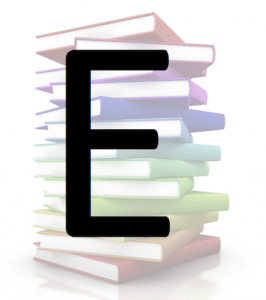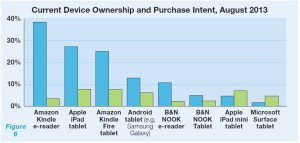
The figures for 2013 tend to show that eBook sales slowed. According to the US data from the Association of American Publishers, adult eBooks grew less than +5% year/year for the eight months ending August 2013 compared to double and triple digit growth in the preceding years. Taking into account all forms of eBooks (children, religious…), total eBook sales actually declined 5% during that same period. That’s hard to understand and the jury seems rather mixed about the reasons. Moreover, the trend around the world is rather mixed as well. The challenges include a cocktail of consumer reluctance to shed their hardbound books (which actually saw an 11.5%% increase through August 2013 in the US), a less than genial — if not hostile — relationship between publishers and electronic book distributors (read: Amazon and Apple), and the still open battle of the eReader devices and platforms. On the latter point, there are many options: Kindle, iPad (with Apple’s iBook) or iPad mini, Android (Google), Nook (Barnes & Noble), Kobo (Rakuten), Sony Reader… Whether the device is a dedicated reader or an embedded feature in a tablet, the customer can quickly feel trapped by the (risk of) non-transportability of titles across devices (think: passing along a book to a friend). Yet, I believe the future for the eBook is rosy.
The future of eBooks is bright
I still fully believe that people will gradually overcome their sentimental, nostalgic feelings about slipping into the comfy armchair and digging into a hardbound book. eBooks are presently roughly a quarter of the market in the US. According to the AAP, “[i]ncluding audio books, board books and several other categories in adult, children’s and religious publishing, ebooks accounted for 22.1% of U.S. publisher revenue through August [2013].” Growth in eReaders elsewhere continues, with particularly robust growth in Germany. Even in the country where le livre est sacré, there are indications that the anemic 3% of publisher revenues coming from electronic books will improve. (See here for more)
Top five reasons based on consumer insights
There are top five reasons why I fundamentally believe that eBooks can only win over time:
- Data. Unlike with paper bound books, there is extraordinary data available via eBook platforms about reading habits and patterns. Assuming big data miners are being put to work, the companies owning and controlling the data, will be able to understand, customise and interact much more effectively with their consumers versus paper books. Netflix’s extraordinary ability to cut, dice and splice film categories and genres to match an individual customer’s film watching habits is a perfect case in point. Astonishingly, Netflix segments movies into over 76,000 different micro-genres according to the whims and habits of its customers. [Read more here in this in-depth article on the Atlantic] Knowing Amazon’s penchant for data and technology, I can imagine how they will be serving us up better offers the more we become hooked to the Kindle.
- Internet Connectivity. The fact that you can immediately click and search a word is beautiful. Satisfying the impulse to buy and download immediately is hard to resist. Granted you need a wifi connection. But, in the future, it’s not hard to imagine that wifi will be plentiful.
- Socialability. The act of reading is inherently individualistic. The opportunity to highlight and share, to become — even discretely — a member of some larger reading community is distinctly pleasing (and optional). Notwithstanding Amazon’s infamous asocial medianess, the ability to tweet or post immediately a specific quote to a social network is pleasing (I note that I am still hoping for a little easier customisation on the Kindle).
- Great Features. When reading, one of my absolute pet peeves is finding a typo in the book and feeling helpless. Over the years, I can’t imagine the number of times that I have circled or marked in the margin a typo. To what avail? Nothing. Now, the Kindle allows you to annotate and submit back when typos or suggestions are made. That’s pure genius and, for the rather A-types like myself, almost orgasmic.
- Last and not least: They’re great in bed. The Kindle (as opposed to the iPad) is easy to hold and flip with one hand. The light is discrete, such that it need not wake a slumbering partner. The iPad’s light adjustment is distinctly more cumbersome and it needs two hands to be read.
Which device?

There are other advantages to the eBook, including the ability to search randomly throughout the text, copy and paste with ease, etc. From an educational perspective, the benefits seem limitless. And I haven’t mentioned the reduced weight factor on trips, when every pound in the suitcase is weighed and accounted for. Naturally, there are plenty of bugs to be ironed out. And, yes, the quaint mid-winter read by the fireside with a hardbound book still retains its pleasure. On balance, though, I can only admire the future prospects of the eReader. Which device will win out is hardly my affair at the moment as long as the competitive pressures continue to encourage innovation and an ever better reader experience. It seems that the Kindle is the dominant reader of choice at the moment, but the iPad has greater range and promise (see right). Will 2014 see a return of double digit growth in eBooks? Will self-publishing provide greater and more savoury opportunities for authors? I don’t know. However, I, for one, am very bullish about eReaders and will be reading much more from my Kindle (which I still far prefer to the iPad). Until airlines deem that the Kindle is not a hazard to safety during takeoffs and landings, I will definitely carry a spare book. Plus, if ever the battery runs out, that old fashioned paperback certainly has its merits.
Your thoughts? Please share some of your experiences!











Trackbacks/Pingbacks